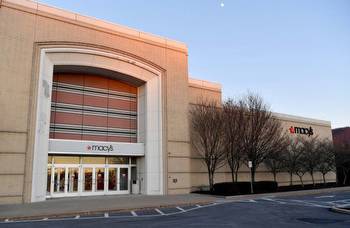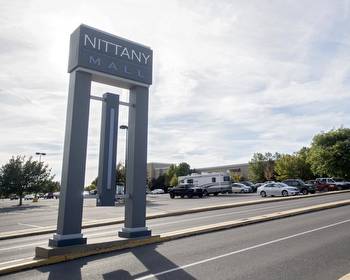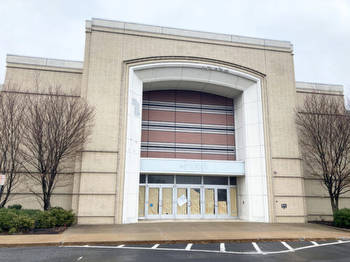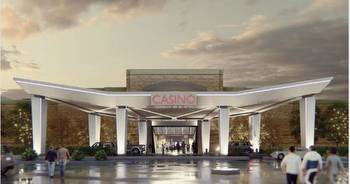Citing Potential for a Costly Lawsuit, College Township Council Declines to Interfere with Nittany Mall Casino Licensing
Preliminary design rendering of the exterior of the proposed casino at the Nittany Mall. Image by Nelson Worldwide
College Township Council won’t be voicing opposition to the proposed Nittany Mall casino after the township’s attorney said interfering with the state licensing process could result in a costly lawsuit.
Casino opponents urged council in September to send a letter to the Pennsylvania Gaming Control Board noting opposition in the community to the proposed casino before a public hearing is held to decide on licensing approval, which could come as early as November.
No council members expressed support for such a letter but asked township solicitor Louis Glantz to weigh in with an opinion on the ramifications of doing so. On Thursday night, after more than 90 minutes of discussion and public comment, council declined to send the letter or to forward correspondence received by the township since the state’s public comment period for the casino license , which is available in its entirety on the township web site.
College Township chose not to opt out as a casino host site when given the opportunity to do so in late 2017 and council conditionally approved a land development plan for the casino at the former Macy’s property at the mall in 2021. Neither of those decisions can now be rescinded and SC Gaming OpCo — the entity led by Ira Lubert that is developing the $123 million category 4 “mini casino” in partnership with Bally’s — has already spent about $20 million predicated on the approvals, Glantz wrote.
“Attempting to persuade a state agency to circumvent the developer’s approval would be an intentional attempt to interfere with the land development approval,” Glantz wrote. “The ramifications of such interference by the municipality could, and likely would, result in a civil suit against the township.”
The township, Glantz said on Thursday, would likely be sued for deprivation of due process rights in federal court, where it could be liable for the $20 million spent by the developer, attorney fees and court costs.
It would not have immunity if it knowingly violated the plaintiff’s rights and could face treble damages, in which a court imposes three times the actual damages if it finds the defendant had malicious intent.
“There is also little chance the township insurance carrier would provide coverage,” for damages or costs of defending the suit because council would have taken an intentional action, Glantz wrote.
In addition to researching relevant statutes, Glantz said he spoke with five attorneys who are active in local government and constitutional law.
“All said the same thing without hesitation: You can’t do that, or you better not do that. That ship has sailed. Those are the kinds of comments I got,” Glantz said.
After initial discussion, nearly two dozen people spoke during public comment on the issue, with many of them saying it would be worth it to risk the legal and financial exposure.
“I would rather stand and fight than bend over and allow the gambling interests to move into the region and flex their muscle, both legislatively and economically,” Lemont resident Steven Smith said.
One resident said $20 million is “not that much.”
College Township’s annual budget is about $11 million and its current reserves are about $2.5 million.
Another resident suggested community members could crowdfund $20 million, or the township could take on bond debt.
Opponents continued to cite worries about increased crime, negative effects on other businesses and gambling addiction, with some saying the social costs outweighed a potential lawsuit.
In the year since a public input hearing about the casino last August, where almost no opposition was voiced, opponents have been far more vocal in public forums than those who support it, inundating the township and Gaming Control Board with correspondence and sending myriad letters to the editors of local publications. About 3,300 people signed a hard copy petition against the casino, and 1,480 have signed a similar online petition.
Opponents have also called on Penn State officials to publicly take a position on the proposed casino given its proximity to the university. That request was rebuffed two weeks ago when Board of Trustees Chair Matt Schuyler said it was not the board’s place to do so and that the university had no role in the approval process.
One person spoke in favor of the casino on Thursday night. Bellefonte resident Todd Orndorff said he has worked as a dealer and supervisor at multiple casinos and that they are required to undergo extensive training to recognize and address gambling addiction, provisions that are not in place for other forms of gambling like lottery ticket purchases.
The proposed casino would have 750 slot machines, 30 table games and sports betting along with a restaurant and bar, entertainment venue and a multi-outlet quick-serve food and beverage area.
Supporters have said that legal online options already make gambling widely available in Pennsylvania and that the region would experience an economic boost from a new entertainment venue. A third-arty impact study submitted by the developer as part of the licensing process projected $1.6 million in tax revenue for College Township in the first year of operation and about 400 full time equivalent jobs. The report concluded that the casino would have “a net-positive impact on College Township tourism, helping to revitalize the Nittany Mall and attract other retail and hospitality operators to the area,”
After public comment, council took no action on sending a letter that would explicitly call for denial of the casino license.
“One thing that strikes me as something that is difficult is that if we were to go ahead with a letter I do believe, just from my standpoint, I’m not being responsible for everyone in the township because then we’re putting liability on the township as well,” council member Dustin Best said. “I think it stands true we have to abide by what our solicitor is telling us.”
Council did however vote 5-0 against sending community correspondence to the PGCB, which Glantz said would be futile at best, since the public comment period has closed and anyone can send a link to the letters to the PGCB. At worst, it could also be construed as interfering with the developer’s due process rights.
The vote was met with jeers and grumbles from those in attendance in person and online.
What’s Next?
A Gaming Control Board hearing officer in July scheduled an Aug. 26 deadline for petitions to intervene in opposition to the license and a tentative hearing date on the petitions of Oct. 19.
As expected, Cordish Companies, which operates as Stadium Casino in Pennsylvania, filed a petition to intervene. Cordish filed a still-pending lawsuit in Commonwealth Court in 2021, arguing that Lubert’s $10 million bid at a September 2020 auction to apply for a casino license was improperly awarded and should be set aside.
A separate Gaming Control Board hearing to vote on license approval can only occur after the intervention arguments are settled.
Since their inception, the only Category 4 casino to be denied a license was in Beaver County, and that was because developers acknowledged they did not acquire the needed funding to move forward.
StateCollege.com Breaking News
Receive all the latest news and events right to your inbox.
























